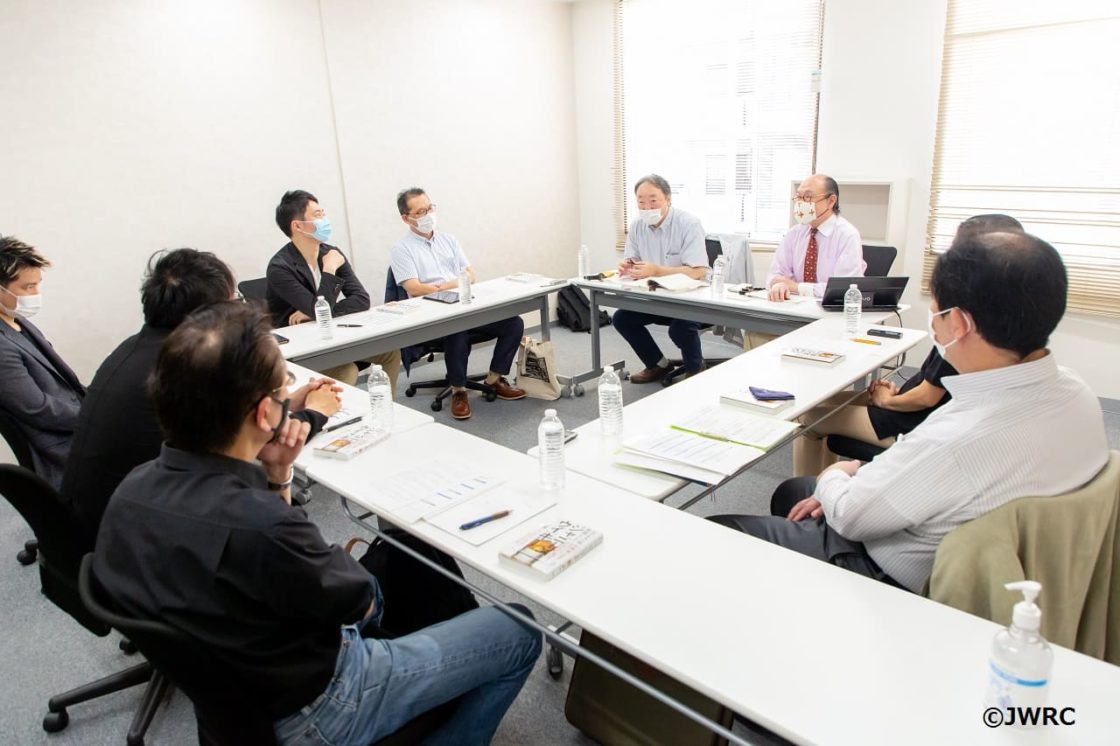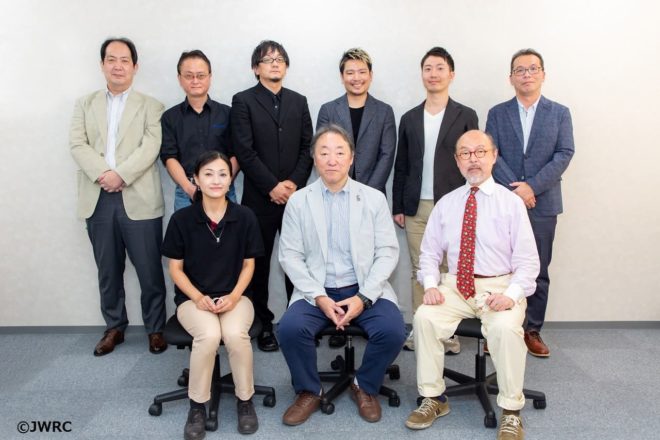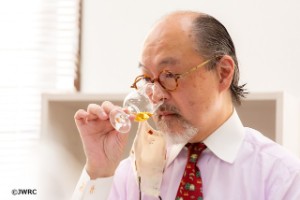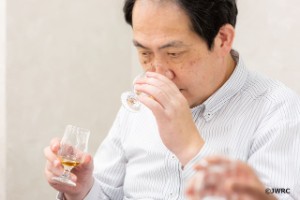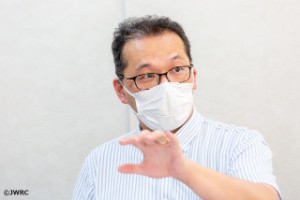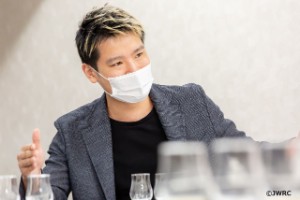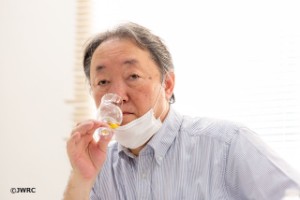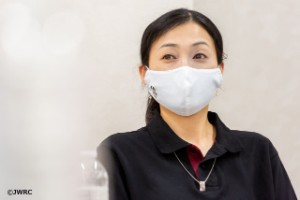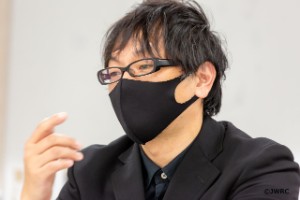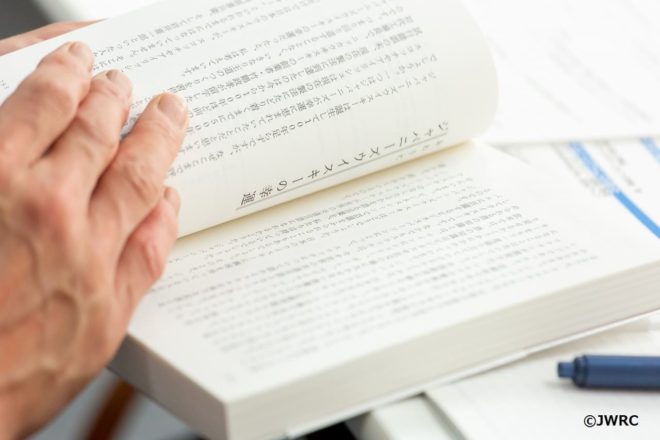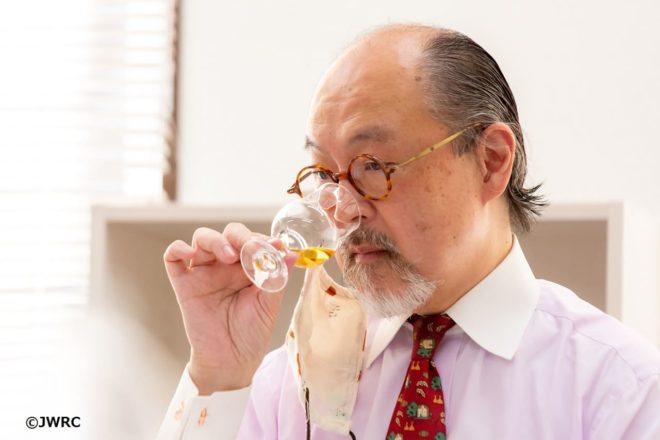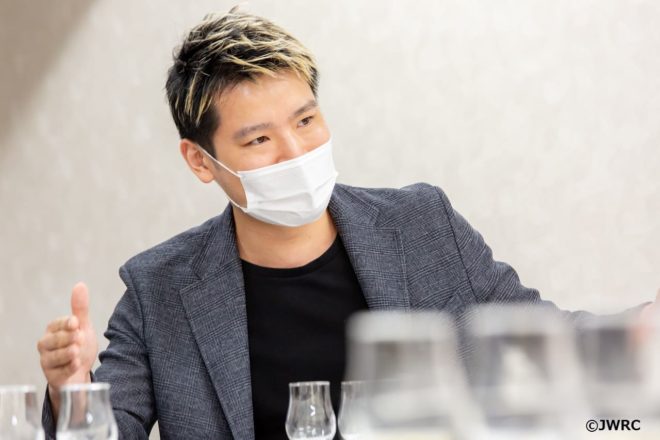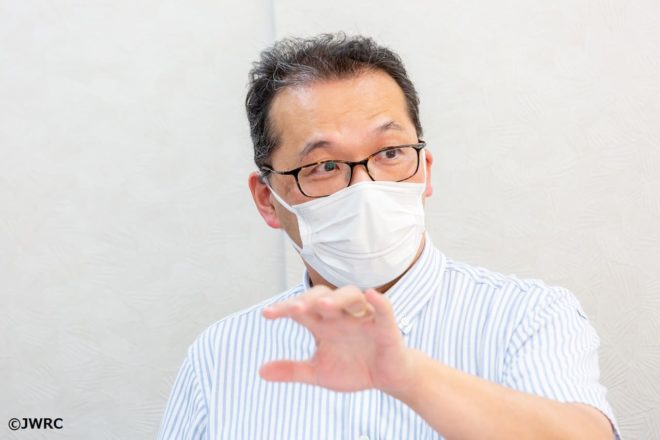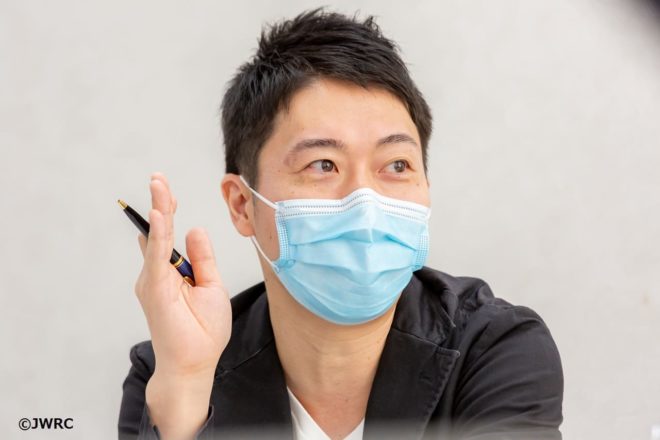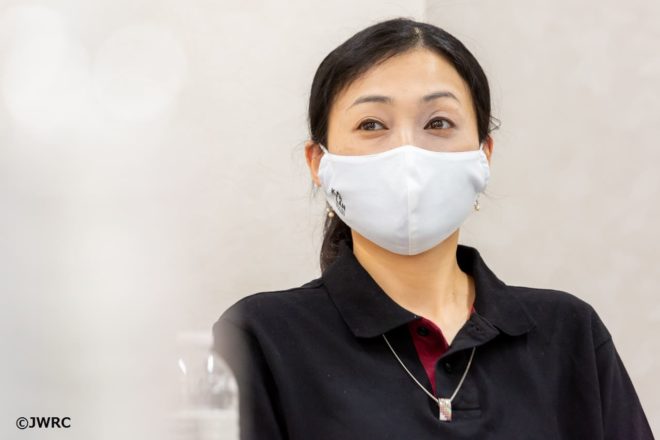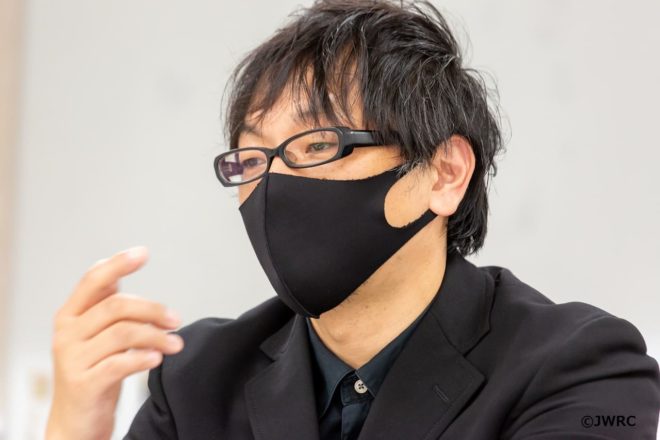Even during COVID-19, the popularity of Japanese whisky is unstoppable. Looking over export statistics from January to July, the yen value of domestic whisky has taken the #1 position, exceeding the value of sake. It’s growth of 17.1% YoY. However, at liquor stores and grocery stores outside of Japan, “Japanese whisky” that you’ve never seen before lines the shelves. Are they really Japanese whisky? To avoid betraying these overseas fans of Japanese whisky, hasn’t the time finally come to decide on a standard for Japanese whisky?
Text: Editing Department, Mamoru Tsuchiya
Photos: Ayumi Fujita
This article originally appeared in Japanese in Whisky Galore Vol.23 / December 2020.
The Japanese Whisky Standard
Before reading the roundtable report, let’s take a look at the actual text that defines whisky in Japan’s liquor tax law.
- Distillate of alcoholic wash created via the fermentation of a saccharified substance made of malted grain and water. (Distillation of the wash must produce an alcohol concentration of 95% or less.)
- Distillate of alcoholic wash created via the fermentation of saccharified grain created via malting grain and water. (Distillation of the wash must produce an alcohol concentration of 95% or less.)
- Liquor created by adding alcohol, spirits, flavoring, coloring, and/or water to #1 or #2 (#1 or #2 must comprise 10% or more of the liquor created after adding alcohol, spirits, or flavorings)
How about it. It’s pretty cryptic text, and it’s unlikely that many people reading it would be able to interpret it immediately. Put simply, you could say #1 refers to malt whisky, and #2 refers to grain whisky. But it says nothing about the method of saccharification, the method of fermentation, the distilling equipment, and most embarrassingly, nothing about maturation nor the material used for casks. Going further, it says nothing about the minimum abv when bottling. However, the biggest problem with this liquor tax law is that it has absolutely no requirements for the place of origin.
This is purely a definition needed for taxation of whisky in Japan, and it’s not a law that codifies Japanese whisky. That means that as long as the tax on it is paid, it doesn’t matter what country it’s from, and it’s not a problem to put a label that says “Japanese” on a bottle that contains Scotch, then sell it. It is not in any way intended to safeguard/develop domestic whisky, or protect consumers.
That all might be unavoidable given the characteristics of the liquor tax law itself, but more significant problem is in the meaning of #3. Perhaps this was originally intended to apply to a mixture of #1 and #2, a blended whisky, but it allows up to 90% of the final volume to be other alcohol (brewer’s alcohol/neutral spirits), spirits, and also coloring (caramel) and flavorings. This means it needs only contain 10% of total volume of what the world recognizes as whisky, which is a) made from grain, b) distilled, and 3) aged in wooden containers. At least in the UK and EU, this would not be allowed to be called whisky.
In the interest of space we’ll leave out the details, but the liquor tax law has three problems: 1) it has no country of origin requirements, 2) even unaged spirits can be called whisky, and 3) up to 90% of non-whisky alcohols and spirits can comprise the final product. At a time when made-in-Japan whisky is set to become the #1 alcoholic export, beyond sake, we believe it’s imperative a definition for Japanese Whisky be decided immediately.
Text: Mamoru Tsuchiya
Roundtable
To discuss the definition of Japanese Whisky, a panel of nine members chosen from Whisky Galore Tasters and TWSC Executive Committee met up in September 2020. Discussions focused on the current issues and a direction for the future.
Members
Mamoru Tsuchiya: We’ve met up today to have a discussion about what should be done going forward regarding the definition of Japanese whisky. Four years ago, in 2016, in Connoisseur Club (a magazine that was published for holders of the Whisky Connoisseur certification), we brought up the issue and started work on a proposed definition. Because of NHK’s Massan TV drama, in the midst of this Japanese whisky boom, we began to get more inquiries about what Japanese whisky is. In tandem with the increased popularity of Japanese whisky overseas, in the US and other countries we are seeing more and more bottles that we’ve never seen before lining shelves being labeled as “Japanese whisky.” We don’t want to contribute to any misunderstandings of people overseas, and a definition–regulation, essentially–must be decided. That’s why in 2016 we held a press conference and proposed that Japanese whisky needs a definition. Hayakawa-san and myself joined several meetings of the Japan Spirits & Liqueurs Makers Association as observers. At the time, we were told that a working group would be formed within the Association to fix a definition. That was in December 2016.
We don’t know if there was any progress or not after that, but for 2020’s Tokyo Whisky & Spirits Competition, in August 2019, we created an independent definition to apply to entries in the Japanese whisky categories. It was also last year that we heard the working group would be announcing a decision. But 2020 rolled around, and there was nothing. However, although nothing has been made public, we understand that internal discussions have been happening in companies over the past three years.
That brings us to now. We feel that awareness of the problems with the current liquor tax law need to be known to readers of Whisky Galore, thus this roundtable. To start things off, Hayakawa-san, you’ve been working with us for the past five years. What do you think?
Ken Hayakawa: As of four years ago, the Japan Spirits & Liqueurs Makers Association was supposed to revisit the definition of Japanese whisky, put a proposal together via the working group, and lead the industry effort to get it implemented. And we’ve heard nothing yet. 2020 was the year of the Olympics, so they must have wanted to announce it last year, but that didn’t happen either. We’re completely blind.
Tsuchiya: We also thought that the Olympics would provide a big opportunity. An increase in inbound tourism and increased demand from overseas. Earlier this year The New York Times published a piece shockingly entitled “Some Japanese Whiskies Aren’t From Japan. Some Aren’t Even Whisky.”
Unlike overseas, Japan’s liquor tax law allows up to 90% to be brewer’s alcohol. So even if it contains alcohol not made from grain, it can still be labeled as whisky. This would be unbelievable in the EU. For that matter, the rest of the world basically says whisky must be made from grain. Stuff made from molasses is not allowed to be called whisky. In the past Japan had a grading system, which I believe led to the current situation. I’d be interested in hearing from all of you, what are things like on the ground at bars, liquor stores, etc.? Let’s hear from Suzuki-san first.
Too many problems with Japanese whisky to support new drinkers
Shoji Suzuki: Actually being here today is something I have been awaiting for some time. I’ve thought this to be a problem for a while. Back in the old days there were a lot of imitation whiskies, so many older people don’t have a good impression of whisky because they were misinformed. These days younger customers have the internet and such so they’re able to acquire information and have basic information, making them interested in whisky. But even then there aren’t many people who are aware of what’s going on inside bottles of Japanese whisky. It’s bad when consumers are wrong because despite the contents of the bottle being entirely Scotch, they say “this is made in Japan.” It’s frustrating because even though some places are serious about making whisky, those bottles get lumped together with the other bottles.
Tsuchiya: So there are a lot of general consumers who don’t know what’s inside of the bottle. If they know were to know that, actually it’s this Scotch, but still drink anyway, it’s fine.
Suzuki: Japan is very sensitive about additives and country of origin in food. But when it comes to alcohol, despite it going into those same mouths, that doesn’t seems to go out the window. I don’t know why. It’s something I’ve been thinking about for a while.
Tsuchiya: It’s similar with the back labels of bottles too. The back labels list the ingredients as “malt” and “grain,” but it’s unclear whether “malt” refers to malt whisky or actual malt. Likewise with “grain,” is it referring to grain whisky, or grain? We have no idea. And, we don’t know what country it’s made in. That’s another problem. Shizuya-san, how about you?
Kazunori Shizuya: I think that at my bar, there aren’t many people who know that Japanese whisky contains spirits that aren’t whisky. But when you ask younger people who are put off by whisky about it, a lot of them say that it’s because they had a cheaper whisky and didn’t like it. They had a bad experience with that flavor. Whisky subsequently spreads as something bad, and young people are turned away from learning more. Most troubling is when if their first experience with whisky isn’t good, it means all whisky isn’t good.
Tsuchiya: Those are the imitation whiskies that Suzuki-san mentioned earlier. But the Japan liquor tax law allows up to 90% brewer’s alcohol, so unfortunately that’s what happens. And the remaining 10% isn’t necessarily made in Japan. You could add spirits to Scotch and still call it Japanese, which is troubling. What are your thoughts, Shibuya-san?
Tomomi Shibuya: At my bar we have a whisky called “Azabu.” I’m even a bit hesitant to explain it to customers, all I could say was “it’s supposedly a Highland Scotch.”
Suzuki: I heard a story from a friend, where a customer came in and said, “You can’t find Japanese whisky these days, right? But I found some!” And the bottle he pulled out wasn’t a Japanese whisky.
Tsuchiya: Even at the convenience store, if there’s a whisky with a Japanese name sitting right next to a bottle of Johnnie Walker, people might assume it’s a Japanese whisky. Then they drink it and hate it. That’s a scary situation. But with Japanese whisky being as popular as it is, we even see that kind of thing at the big box retailers these days. What do you think, Kurashima-san?
Hideaki Kurashima: My shop is at Tokyo Station. Before this whole corona situation, there was a lot of inbound tourist demand, where many people came in wanting to buy Japanese whisky. That was good when single malts were still around, but these days the supply just isn’t there anymore. There are now more bottles on the shelf that are difficult to explain. “This is probably Scotch,” or “this also has Japanese whisky,” okay so how much? And so on. It’s hard to gauge how transparency I should be. When less knowledgable customers come and buy something that has a Japanese-looking label but is actually foreign whisky, I find myself thinking, that’s not Japanese whisky. I think that if I could be more confident in explaining products, my customer service would change. But it’s a conundrum, because I’ve also made sales because it’s not very clear. These days pretty much any Japanese whisky on the shelf, and it will sell.
Tsuchiya: Are there people who buy the whisky anyway, knowing that it contains Scotch?
Kurashima: There are customers like that, but more are after single malts. And there are a lot of bottles like Ichiro’s Malt, Suntory, and Nikka that sell because of the brand name. But I think both non-Japanese and Japanese customers have distanced themselves from some bottles like Suntory Ao. Perhaps that’s because when it’s compared to something like Ichiro’s Malt white label, another world blended, Suntory Ao has a strong American and Canadian whiskey aroma about it.
Tsuchiya: Yet Suntory Ao clearly states that it’s a blend of whiskies from 7 different distilleries throughout the world. These kinds of world blended whiskies could become a trend here in Japan. In the past these would have simply been sold as whiskies, but it seems that the thinking is that they should now be released as world blended whiskies. Nikka just released Nikka Session, for example. In the past this would probably have been just released as a whisky. But this time around they are loud and proud that it’s Yoichi, Miyagikyo, and Ben Nevis. It’s a new way of doing things. For Ichiro’s Malt & Grain, too, it would have been more clear if it was called Ichiro’s World Blended. Matsuki-san, given your different perspective, what do you think?
Scotch is trusted worldwide because of its clear definition
Takashi Matsuki: From consumer perspective, a definition doesn’t change the flavor. If you can drink it and enjoy it, perhaps it’s better left unknown. Something of a pandora’s box. But from the viewpoint of a whisky hobbyist, having something authentic and something not-so-authentic stand in the same ring is definitely not good for beginners. In my case I started with Scotch. In Scotch it’s clearly categorized, and it’s clear why expensive bottles are more expensive. If you do the research you can understand the reasons, and you begin to understand the value. The current state of Japanese whisky is bad in the context of this knowledge acquisition about authenticity.
Tsuchiya: When you put it like that, Scotch has the clearest definition, and it’s categorized. That clear definition is one of the reasons Scotch took off across the world. There isn’t any whisky that offers more transparency. Japanese whisky is on the uptick right now, but unless a firm definition is decided, that uptick may be gone in 10 or 20 years. What do you think, Nakai-san?
Yasuyuki Nakai: If it were just the Japanese domestic market, maybe we would be fine with local rules. If we start to look overseas, though, we need to obey those countries’ business rules. Outside of Japan there are acts and regulations. And there’s a mindset that a definition = brand value. Looking back at Japanese whisky, there is no definition, thus no “Japanese whisky” brand value. With the creation of a definition we can create value. And that definition must be quantified. A quantifiable definition builds credibility. Credibility builds to trust. Ideally the world begins to recognize it as well.
Tsuchiya: There’s already an incredible amount of faith in “Made in Japan” products. Why is alcohol so different?
Suzuki: Maybe booze isn’t especially ingrained in Japanese culture.
Nakai: I also think that it may be related to the war. Suntory’s Yamazaki Distillery as founded in 1923, during the Taisho era, so perhaps it could have gone that direction, but then the war happened. During and after the war, when it came to alcohol, the first priority was volume, and the contents of the bottle took a back seat. So when we look overseas now, it’s like… oops.
Suzuki: In countries around the world, the definitions may have originally been created for the purposes of securing tax revenue, but these days they’re also about protecting the goods of those countries. Alcohol has been taxed in Japan since the Muromachi period (1336 – 1573). But from the beginning whisky was from something that came from overseas, an unknown, so the tax code had to be as it is today. If the tax law at the time required three years maturation, smaller players may not have been able to enter the market at all. The fundamentals of making a definition are different from other countries.
Tsuchiya: As you say, if Japan looks to export products overseas, parts of the definition are about protecting our own goods. At the moment you can still call whisky made overseas “Japanese whisky.” So while we may think that kind of thing needs to be stopped now, if in the past authorities simply assumed whisky = foreign product, they would be less likely to protect Japanese whisky versus some more Japanese product like green tea. From the point of view of other countries, Japan has a lot of minute rules about all sorts of things. For them it’s hard to imagine that Japan doesn’t have a definition of Japanese whisky.
Suzuki: Japan has some of the world’s best blending technique, so it’s something that should be made public more. “Yes it contains whisky from overseas, but we’re also the only ones capable of creating this flavor.”
Liquor tax law and maker involvement
Tsuchiya: Nakai-san addressed this a moment ago, but whisky was first defined in Japan’s liquor tax law during WW2, and it was further categorized in a post-war revision in 1949. What kinds of requirements exist for labeling at the moment?
Hayakawa: Only the raw ingredients are required. “Malt” or “grain” simply means malted barley and grain like corn. It doesn’t necessarily mean malt whisky or grain whisky.
Tsuchiya: Under the current labeling rules, there is no requirement to display the country of origin of those malt or grain ingredients. Likewise, there is no requirement to list brewer’s alcohol either. Shibuya-san, as a lawyer, what’s your take?
Hiroshi Shibuya: Even for food you would generally only list the final point of processing. So if you purchase whisky from overseas, then blend it and bottle it in Japan, it would still be considered domestic whisky.
Tsuchiya: In Europe there are requirements for listing things like the raw ingredients, their country of origin, and additives. But we don’t have that in Japan. What law is that based on? For food there’s some traceability with country-of-origin and processing location labeling requirements, but there’s a shocking lack of transparency in alcohol. It’s bad for general consumers as well. The government may not want to require that, but if consumers don’t demand such information be disclosed, it’s unlikely anything would change in this country.
Shibuya (Hiroshi): The government’s goal is collecting taxes. So long as they get their tax revenue, it’s fine with them. That’s why they increased the tax rate for happoshu — because it’s selling well.
Tsuchiya: The tax rate calculation is actually pretty simple. Any whisky 37% abv or less is taxed at a flat 370,000 yen per 1000L. Per percentage point above that, it’s 10,000 yen. So a 40% abv whisky is 400,000 yen per 1000L, or 280 yen per 700ml bottle. If 90% of the contents of the bottle isn’t even whisky, but if makers pay tax on it as though it were whisky, of course the tax man is happy. Turn that concept on its head: if it weren’t called whisky, it would need to be taxed differently.
Shibuya (Hiroshi): Sake is also an important part of Japanese culture. But even for sake there’s nothing written that it needs to be made with Japanese ingredients or in Japan. There are no regulations in the tax law for it.
Tsuchiya: There was a directive issued by the National Tax Agency, right? It said something like, if you’re going to label something as sake, it needs to be made with rice grown in Japan.
Shibuya (Hiroshi): But only at the bulletin/directive level. The government should be be in charge of assuring that consumers don’t get misled by labels. I think that’s the best way to approach this.
Tsuchiya: A while back I had you do some research on Japan Wine, Shibuya-san, and I remember you saying that there were no examples of punitive measures being taken. If we’re the ones that are going to make this definition of Japanese whisky, it’s likely only to end up as a bulletin/directive. Whether or not there are punitive measures will make a big difference. With no punitive measures, it essentially means that the rules don’t need to be followed. And if it’s some internal code followed by the Japan Spirits & Liqueurs Makers Association, then companies that aren’t members don’t need to follow it. There’s something wrong with that. Some smaller craft distilleries aren’t members, so they could essentially do anything they want.
Shibuya (Hiroshi): Perhaps it would result in revocation of their distillation license. But I expect that would rarely happen.
Kurashima: What are the makers saying?
Tsuchiya: We’re not part of the working group so we can’t say for sure. But as far as we can tell, some places are saying a definition needs to be clearly decided, and others are vehemently opposed because it’s a matter of life and death for them.
Hayakawa: I think that on the maker side, for the past 2-3 years they’ve already been dealing with this in some way. Increasing their distillate or building up stock, for example. Halting sales of their major products means they must see something coming.
Suzuki: So the big players are thinking about this.
Hayakawa: It’s tough for the big makers, but it should be easy for smaller places to respond. The smaller players need a way for their products to stand out against the competition. There are merits for them in this, and they should welcome the opportunity to conform to overseas standards.
Suzuki: Even if there are people opposed to it for the time being, over time their opinions ought to move in that direction.
Hayakawa: With Japanese whisky getting more and more praise, when the time comes to release it outside of Japan, it’s a required step. Releasing “whisky” from Japan that can’t be called whisky in the rest of the world is a non-starter. Any maker that’s considering the global market is probably already thinking about this.
Suzuki: If there are people of the opinion that the status quo should be kept, they need to be persistently reminded of the merits of deciding a definition.
Hayakawa: But this could result in a reduction of the varieties of cheap Japanese whisky that are out that right now. We need to keep in mind that consumers find cheaper prices far more accessible, and the possibility that they could be lost to other categories of alcohol with cheaper taxes, like shochu.
Tsuchiya: The definition that the Association apparently has in mind is more strict than the one we created for TWSC. For TWSC we require a minimum of 2 years maturation for whisky, but they’re likely going to call for 3 years. And for casks, TWSC doesn’t specifically require wooden casks, but it looks like their definition will, in order to conform to global standards. And whether or not they’ll require 100% grain as raw ingredients. Personally I think that it’s important they be clear about the basics of whisky, so they’re likely to remain firm on that point. I think they don’t want to call it whisky if it contains brewer’s alcohol that isn’t made from grain. Just like the EU doesn’t recognize Indian whisky that uses molasses-based alcohol as whisky. For years of aging, I think they’ll match what other countries are requiring. Me personally though, I think 2 years is fine for Japanese whisky.
Towards the centennial of Japanese whisky
Tsuchiya: With the centennial of Japanese whisky approaching in 2023, I think that if we don’t decide on a definition, it would be a shame for those that follow after us. It’s not like the government is going to do anything about it if we just leave it be.
Shibuya (Hiroshi): Let’s get together the members of the Diet that like whisky, and have them make a caucus. And they can push the agenda in the daily parliamentary proceedings. That might result in a change to the law.
Tsuchiya: The Japan Wine definition was decided just because a member of the cabinet said something about it. That sort of lobbying might be necessary.
Suzuki: Even if they aren’t interested in whisky, it could be sold as “protecting Japanese culture, protecting national interests.”
Kurashima: Something like a signature campaign to channel consumers’ voices. Have them sign the festival tickets, for example. If they don’t sign it, they won’t be allowed it. Okay that’s a joke, but it would be a step to raise consumers’ awareness of this issue.
Tsuchiya: A campaign like that might be a good idea. For the most part, mass media doesn’t know there isn’t a definition of Japanese whisky. We need to put our all into this.
Shibuya (Hiroshi): Animal rights activists spread things on social media, and my office ends up with a lot of postcards.
Tsuchiya: That sort of activism on social media is necessary as well. To wrap things up, I’d like to hear everyone’s opinions about what the next steps should be to raise awareness of this issue with the general public,
Shibuya (Tomomi): I’m not so great at talking, so I need some sort of textbook that has these laws and required definitions. As it stands, I can’t explain all of this to my customers. And while price is an issue, I’d like to see more reasonably priced bottles as well.
Tsuchiya: And Hayakawa-san?
Hayakawa: I think the definition needs to move forward. There are a few things to work through to get that done, and the working group needs to address those. It can’t be left solely entirely to progressives, like for example a JWA (Japanese Whisky Association) if it were created. The definition needs to reflect the opinions of makers as well. Consumers need as much information disclosure as possible, and they need correct information. It would be good to increase consumers’ knowledge level too.
Tsuchiya: About half a year ago there was some news online that someone was setting up a whisky distillery with a budget of 20 million yen. Anyone that knows anything about whisky knows that 20 million yen isn’t enough to build a whisky distillery. Even a single pot still is 40 to 50 million yen. It’s imperative that accurate knowledge is spread to consumers. On to Suzuki-san.
Suzuki: I think any food and drink that enters people’s mouths needs to be entirely from the consumer point of view. Since Japanese whisky is well-received around the world, it’s in our interests to make a specific definition. It will help the country and government gain trust. From there it can be connected to national interests. That point needs to be driven home.
Kurashima: We need a clear definition to protect the integrity and quality of Japanese whisky. Domestic products are being revisited given the pandemic, and in a sense consumption is more healthy. This is good timing to create a definition
Tsuchiya: How about you, Shizuya-san?
Shizuya: It’s not bad to use imported whisky, in fact it can even be better in some cases. But making false representations and misleading consumers is bad. I think it’s best that the definition make things easier to understand. It may be difficult to get consumers from zero to this particular level of knowledge, though. That’s why the labeling is particularly important. It would be good to have something like the Scotch Whisky Association, perhaps a Japanese Whisky Association. If there were a JWA, would domestic distilleries join it? Where would the budget come from?
Tsuchiya: That might be tough. The SWA’s budget is paid by each of the participating members based upon their sales revenue. A bit of the funding does come from the government, but for the most part it’s a private organization. Replicating that setup with a multi-million dollar budget in Japan would be difficult. That said, even during this corona pandemic, exports of whisky made in Japan are up. It’s set to overtake sake. The value is about 25 billion yen, or about 15 times the value of shochu. But this “Japanese whisky made overseas” shouldn’t be included in that figure.
Shizuya: To break down these strongholds of the government and law, makers and consumers need to join forces.
Tsuchiya: I think asking for makers’ cooperation will come a bit later. The first step is having consumers raise their voices. It will need to be done with a method never before seen with whisky associations throughout the world. Collecting membership fees from consumers, or using crowdfunding to raise the necessary funding, for example.
Shizuya: And I guess domestic distilleries don’t swap stocks at all. That’s why they need to rely on overseas sources for whisky. The establishment of the JWA would lead to more interaction amongst distilleries, enabling them to begin swapping stocks.
Standing with confidence in the same ring as other countries
Tsuchiya: What are your thoughts, Matsuki-san?
Matsuki: It’s mostly been covered already, but it’s not right that people who sell alcohol feel guilty about it, not to mention what the makers themselves are thinking. Something that they make and sell is being mistaken for domestic whisky here in Japan. Surely they are aware of that and feel a ping of guilt about it. It’s unhealthy. In Scotland and other countries, makers are proud to say this is our whisky, and this is our culture. That’s important for craftsman, not just because it motivates them to create even better products, but to support the health of the industry.
Tsuchiya: That’s where it all begins. What do the people who make it feel like. Perhaps that’s why they don’t want to touch it.
Nakai: When you consider globalization, it’s something that countries will begin to recognize over time. That’s why a definition is necessary. Auctions for example, could happen more often with a definition of Japanese whisky. A balanced approach is necessary.
Tsuchiya: You could say that a definition is where everything starts. It’s amazing we’ve come this far without one! It’s something that’s been swept under the rug by both Japan and the international community, but for globalization to continue its progress, a definition is required. Other countries will be extremely assertive about it as well.
Nakai: I want to stand on equal ground.
Tsuchiya: Today’s roundtable marks the beginning, and let’s keep doing what we can to make this happen. With the approaching centennial for Japanese whisky, I hope you’ll continue providing your help going forward.
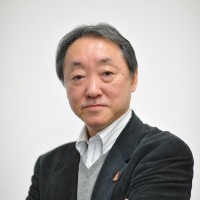
Mamoru Tsuchiya is Japan’s foremost whisky critic. He is the Representative Director of the Japan Whisky Research Centre, and was named one of the “World’s Best Five Whisky Writers” by Highland Distillers in 1998. He served as the whisky historian for NHK’s Massan and he has published several books such as The Complete Guide to Single Malt Whisky, Taketsuru’s Life and Whisky, and The Literacy of Whisky. He is the editor of the bimonthly Whisky Galore, Japan’s only print whisky magazine.

